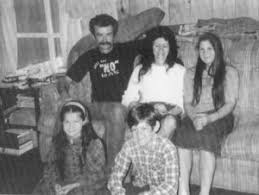Randy Weaver moved his family to northern Idaho in the 1980s to escape what he saw as a corrupt world. Over time, federal agents began investigating the Army veteran for possible ties to anti-government groups. Weaver was eventually suspected of selling a government informant two illegal sawed-off shotguns. To avoid arrest, Weaver holed up on his land.
On Aug. 21, 1992, a team of U.S. marshals scouting the forest to find suitable places to ambush and arrest Weaver came across his friend, Kevin Harris, and Weaver's 14-year-old son Samuel in the woods. A gunfight broke out. Samuel Weaver and Deputy U.S. Marshal William Degan were killed.

The next day, an FBI sniper shot and wounded Randy Weaver. As Weaver, Harris and Sara ran back toward the house, the sniper fired a second bullet, which passed through Vicki Weaver's head and wounded Harris in the chest.
The family surrendered on Aug. 31, 1992. Harris and Randy Weaver were arrested, and Weaver's daughters went to live with their mother's family in Iowa. Randy Weaver was acquitted of the most serious charges and Harris was acquitted of all charges.

The surviving members of the Weaver family filed a wrongful death lawsuit. The federal government awarded Randy Weaver a $100,000 settlement and his three daughters $1 million each in 1995.
The Ruby Ridge incident marked a new era in state terrorism and in government meddling of the affairs of private citizens and the suppression of their rights, privacy, life, liberty and the pursuit of happiness.